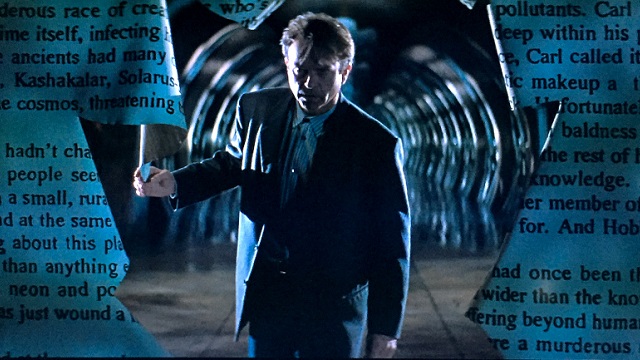Despite being centered on a mega-horror author, John Carpenter’s In The Mouth of Madness is most decidedly not like a Stephen King novel. Though inspired by H.P. Lovecraft’s brand of ethereal horror, this film plays far closer to a Clive Barker story of pop culture obsession and mania. Of all John Carpenter’s movies, In The Mouth Of Madness is driven by a constant driving pace that pulls the world apart at its seams.
The world is already pulled apart, and maybe it was John Trent (Sam Neill), a mental patient, who helped it along. In the gothic asylum, Trent is the type of patient to drawn crosses all over his body and cell while bitching about The Carpenters. Back when the world made sense, Trent was an insurance fraud investigator who figured out if shop owners kept the product before they burned down the warehouse. His latest job is to hunt down Sutter Cane (Jurgen Prochnow), the hottest horror writer in America. Scarier than Stephen King, Cane’s writings create mass paranoia and delusion in its readers who separate from reality. But, Trent believes there are clues leading him to Cane’s favored fictional town of Hobb’s End, NH (only a few miles from Bangor, Maine).
John Carpenter ditched his usual methodical tension building and thrusts In The Mouth of Madness on a train driven by a power-chord heavy metal score. Even from the beginning, the movie is on the rails of a printing press driven to mass produce millions of Sutter Kane paperbacks and be driven out to the world. Carpenter pops in and out of hallucinations and dreamscapes with such frequency that the narrative holds no sold ground in reality. Still, the straightforward narrative hammers on with little regard for what reality actually is. It is horror after all, and what’s scarier than the absence of reality?
Sam Neill anchors Madness with his most gleefully distraught performance as a cynical investigator used to interrogating people’s fictional realities and getting to the heart of what’s actually real. Even as his mind steadily decays, his super serious ability to hang on to his narrative becomes his largest burden. By the time he lands in the land of Stephen King (where all of the normal people hold the greatest potential for gimmicky horror), we’re all in the grip of this funhouse ride.
In the 22 years since its release, In The Mouth of Madness has only gotten more relevant to modern culture’s obsession with all things mass culture. How else to explain the cult of personalities that defined our obsession with Obama, Bernie, Hillary and Donald Trump? How else to explain the multitude of realities that we butt our heads with each other to the point where some Americans are constantly on the brink of threatening everybody with an axe asking if you read Breitbart or Verrit. There’s a cultural madness swirling right now unrelated to horror writers that still has a sense of the cultural fanaticism shown in Madness. It only gets creepier from here.

